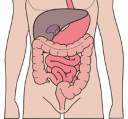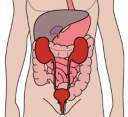The digestive system
 The stomach
The stomach
When you eat, the food travels down a long, narrow tube called the food pipe into your stomach. Here, the food is churned into smaller pieces and your digestive juices turn it into liquid.
The small bowels
The journey continues as the contents of your stomach move into the small bowel (ileum), where digestion finishes. Your body absorbs the nutrients it needs for energy, growth and building new cells and channels these into the bloodstream.
The large bowel
When all nutrition has been absorbed, the remains move into the large bowel (colon), where your body absorbs more fluid to make the waste more solid. The muscles in your colon wall then push any waste forward into your rectum, where it passes out of your body through your anus, with the aid of the sphincter muscles, as stool.
The urinary system
 Urine is made by your kidneys and travels down two tubes called the ureters to your bladder. Urine is produced all the time, but it is stored in your bladder until you get a sense that you need to urinate. The urine then passes out of your body through the urethra.
Urine is made by your kidneys and travels down two tubes called the ureters to your bladder. Urine is produced all the time, but it is stored in your bladder until you get a sense that you need to urinate. The urine then passes out of your body through the urethra.